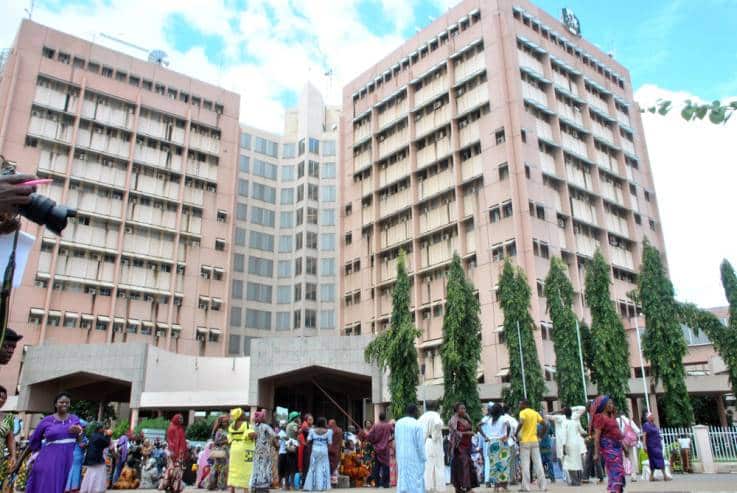FG has disbursed ₦1.2 Trillion to 17 Ministries to fund capital projects.
NewsOnline Nigeria reports that the Federal Government disbursed ₦1.23 trillion to 17 ministries for capital projects in the third quarter of 2023, as per the Budget Implementation Report for Q3, 2023.
This amount was 75.4% lower than the ₦5trn initially allocated for capital expenditure in the 2023 budget, resulting in a deficit of ₦3.8tn.
These projects typically include the construction, acquisition, or refurbishment of tangible assets like buildings, roads, bridges, dams, schools, hospitals, and other facilities. The report further indicated that the ministries utilized only ₦962.87bn out of the total ₦1.23tn disbursed.
The report partly read, “The release of funds to MDAs for capital expenditure as at the third quarter of 2023 was done in tranches based on availability of resources and government priorities. Data from the OAGF on 2023 capital performance for MDAs as of 30th September 2023 showed that a total of N1.23tn was released to MDAs and cash-backed for 2023 capital projects and programmes.
“The sum of ₦351bn was released as the first Tranche, ₦331.92bn was the second Tranche, and ₦208bn was the third Tranche. A total of ₦75.35bn was released as AlEs MDAs Budget and ₦261bn as AlEs Service Wide.”
Breakdown Of How Money Was Shared Among MDAS
The report indicated that among the 52 MDAS detailed in the Office of the Accountant General of the Federation’s document, there were varying degrees of usage.
Out of the 42 MDAs, representing 80.77 per cent, utilized more than the average of 52.44 per cent of their allocated funds. A total of 35 MDAs exceeded a utilization rate of 65.0 per cent, with only four (7.72 per cent) achieving full utilization.
Furthermore, the utilization report disclosed that 10 (18.18 per cent) of the MDAs had a utilization rate below 40 per cent of their allocated funds. Additionally, five (9.10 per cent) of the MDAS had utilization rates below 20 per cent, and three (5.45 per cent) had not utilized any of the funds provided to them.
The Ministry of Defence received the largest capital allocation of ₦189.39bn, followed by the Ministry of Works and Housing with ₦178.62bn, and the Ministry of Agriculture with ₦128.24bn. Conversely, the Office of the National Security Adviser, Ministry of Environment and Women received the smallest allocations of ₦3.93bn, ₦3.73bn, and ₦5.37bn, respectively.
A detailed breakdown revealed that the Ministry of Defence received the highest allocation for capital projects with a cash backing of ₦189.39bn, yet only utilized ₦180.69, leaving a surplus of ₦9.3bn.
This was surpassed by the Ministry of Works and Housing with a total allocation of ₦178.62bn, which was utilized to the extent of ₦118.65bn, leaving a surplus of ₦57.97bn.
The Ministry of Agriculture, despite receiving a cash backing of ₦128.24bn, utilized only ₦109.89bn, leaving a surplus of ₦18.35bn.
Meanwhile, other departments, such as Water Resources, used ₦21.81bn from a total of ₦28.27bn available, while Education only spent ₦31.35bn from its ₦54.03bn budget, Health allocated ₦34.82bn from its ₦55.77bn budget, and Aviation made use of ₦5.94bn from its ₦20.44bn budget.
In a similar vein, the Ministry of Science, Innovation and Technology allocated ₦12.76bn from its ₦44.08bn budget for capital projects, while Transport allocated ₦43.39bn from its ₦56.55bn budget.
The Ministry of Humanitarian Affairs and Disaster Management allocated ₦37.13bn from its ₦53.4bn budget for capital projects, the Office of Secretary General of Federation allocated ₦14.04bn from its ₦17.37bn budget, and the Police Affairs Ministry allocated ₦27.42bn from its ₦29.79bn budget.
The budget office has mentioned that the majority of projects carried out were local projects not within the scope of the MDAs.
It expressed concern over this trend, stating that these local projects are given priority over those that align with the MDAs’ mandates.
The report added that “Most MDAs’ capital projects are dominated by constituency projects. This practice is disturbing because although most of the projects have no direct bearing with the mandate of the host agencies, they are prioritized over the projects in line with the mandate of the MDAS.”
It further recommended that ‘Considering the preponderance of constituency projects that are not within the mandate of the MDAs, it is important to emphasise and prioritise only capital projects that are in line with the mandate of the various MDAs during budget preparation and implementation.”














